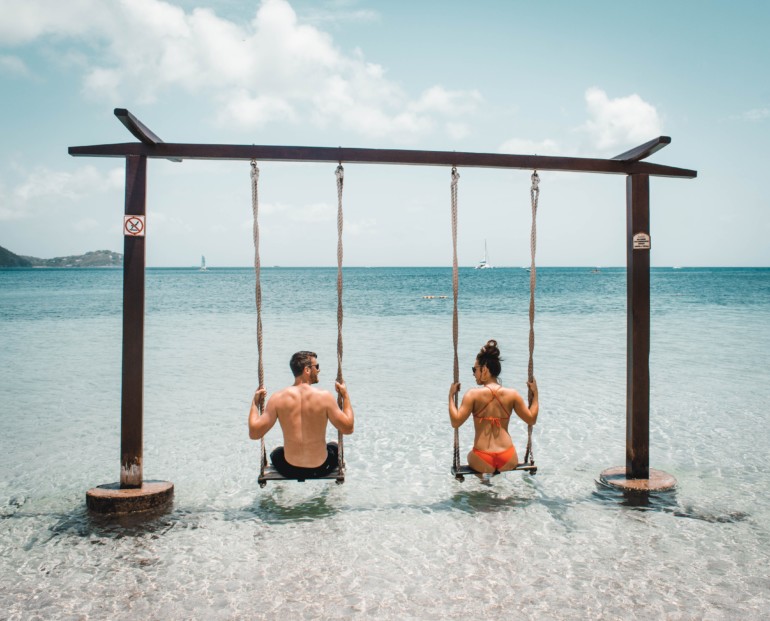So you’ve agreed to take your first couple’s trip. Congratulations! At a minimum, it indicates your relationship is going well, and you enjoy spending time with each other. Whatever else it means remains to be seen.
At least for now, you can safely begin floating ideas about where you should go. But before you seal the deal, you should iron out a few details first, and I’m not just referring to those linen shorts you plan on packing. If you don’t, your trip, and relationship, might see a few wrinkles of their own. That’s because there’s a lot more to planning a couple’s vacation than you probably think.
The idea of a first couple’s trip is to get to know each other better in a leisurely setting, away from the distractions of home. So to help ensure your getaway is a relaxing one, devoid of the kind of conflict you can easily prevent with a small amount of preparation, consider raising the following topics with your romantic partner before you book your trip.
1. Decide who’s treating or if you’re each contributing.
I know, I know. He’s the one who asked if you’d like to go away for a few nights. But this isn’t the first date, and a vacation, even a short one, can get expensive quickly. So don’t automatically assume he’s paying (a) because he asked and (b) because he’s a guy.
How to raise the topic? Ask. “So, how should we allocate expenses?” If he says, “Oh, I’m taking you away, don’t worry about money,” say thank you. Then pick up the tab for an activity or a meal or two while you’re away.
If you’re a woman suggesting the getaway, same deal. Your romantic partner shouldn’t necessarily expect that you’re footing the entire bill. Speak up if you suspect they do.
2. Figure out what your respective budgets are.
Now that you’ve gotten it squared away that you’re both chipping into this holiday of yours, figure out what percentage each of you will be responsible for. If you’re pretty much in the same financial situation, assume that you will split costs equally unless one of you offers to pay more.

On the other hand, if there’s a big difference in what you and your partner can pay, discuss whether each of you can contribute a percentage, perhaps 75 percent from one of you and 25 percent from the other. This approach may require being a little more open about your finances than you might have hoped at this early stage. However, it’s still better you’re honest rather than commit to paying for a trip you can’t afford or don’t want to splurge on because you’ve already prioritized other ways to spend your money.
According to Amy Ongaro, a travel specialist and owner of JWA Travel, “managing expectations in advance paves the way for a smoother and more enjoyable holiday.” The best way to do that, Ongaro advises, is by planning your trip beforehand. “Having an itinerary planned clarifies trip costs and sets realistic expectations so there are no surprises at check out.”
It’s a good rule of thumb and will also do wonders for your relationship and its longevity if you make your plans using the smaller budget as the yardstick. That said, the person with less ability to pay should still feel comfortable. If you love staying in five-star hotels, for example, and expect your romantic partner to split the cost while traveling with them, think about booking a hotel where they can afford to stay comfortably.
Ongaro suggests using a seasoned travel advisor and being upfront about your wish list and financial concerns. A travel advisor with “extensive knowledge of hotels and destinations,” she says, “can match couples with the best options according to their budgets and interests.” Depending on the advisor you choose, they may “have access to special amenities like resort credits and upgrades that can stretch the budget further.”
So even before booking your trip, make sure you pick the right travel advisor to help you. That person should be one who understands the needs of a couple in your situation and has the capacity to see that each of you is happy with your vacation choice.
3. Create a plan for how you will track expenses.
Now that you have a clear idea about your budget and how much each of you will be responsible for paying, come up with a plan for how you will track expenses while you’re away. Maybe you will each pay for your own airfare and split the cost of the room but pool funds from both of you in advance to pay for meals, activities, and other incidentals.
Or, if you’re at a resort, maybe you charge all of your meals, activities, and incidentals to the room and split the remaining costs at the end. Perhaps you track the cost of expenditures in a notebook or the memo section of your phone. The point is to have a plan in place, then stick to the program.
4. Consider the length of the trip.
In addition to budgetary concerns, it’s also important to consider how long your trip will be because you’re essentially testing the relationship waters during a first couple’s trip. Spending this much time continuously together will presumably be a new experience for you, and you don’t want to overstay your welcome.
Ongaro says advance planning not only clarifies expenses but also “helps create the vibe or mood of the trip.” Which hotel is best for a romantic getaway? Which one is full of kids? “These,” she says, “are some of the details that can make or break your holiday.”
Also, if things aren’t going well while you’re away, you don’t want to face cancellation or change fees to cut your trip short. There are probably not many worse feelings than being trapped with someone you’ve just discovered you can’t stand. So, to be safe, limit your first trip to around five nights, give or take. Better to leave each other wanting more.
“Trip insurance,” Ongaro says, “is more important than ever.” She advises making sure your policy includes some coverage related to Covid.
5. Decide on your destination together.
Unless you surprise your partner with a trip you know for a fact they’re going to love, it’s a good idea to choose your destination together. In addition to deciding where to go being part of the fun, it will ensure that both of you feel like it’s your vacation, not your partner’s vacation, and vice versa.

Ongaro does warn that “with so many options, planning can get delayed by sorting through too much information, leading to frustration and feeling overwhelmed.” She suggests “keeping your first getaway together simple, easy to get to, and one that will not break the bank.”
Also, when you pick out a place to travel to together, be mindful not to return to a destination you’ve traveled to dozens of times before. You know, where you went skiing with your buddies every February or Cabo San Lucas, your home away from home with your now ex-wife and kids every Christmas break.
If you do choose to go to a destination where you’ve been before, say, Greece because you just love it and want to share the experience with your new romantic partner, share it at a different hotel from when you were there the last time with a romantic partner. That’s just common sense and will keep you from tarnishing the memory of your first trip away should your new romantic partner become a part of your life for a while or forever.
6. Pack separately.
Are you looking to have your first fight before, during, or on the way home from your first couple’s trip? Then, by all means, share a suitcase. Some people are very particular about how much they pack and how they utilize the space in their bag, and you should not get in the way of that.
Besides, do you really want to start fighting about who’s taken up more space, especially when your bag weighs in at more than 50 pounds at check-in, and you have to start shuffling around your undergarments? You don’t need to find out just yet how your new romantic partner functions under this kind of pressure, especially if you’re about to board a six-hour flight.
Ongaro has a couple of pro tips: “I love using packing cubes. Packing cubes help organize your clothes and keep them compressed. If you must share a suitcase, color-code your cubes for each of you.”
7. Decide how long you need to get to the airport if you’re flying.
Remember the Hertz commercial when O.J. Simpson ran through the airport? If you don’t want to do the same with your new romantic partner on the way to your first romantic getaway, or if you plan to leave at 6 a.m. because you have a six-hour drive to the resort but want to get there by lunchtime, discuss your game plan in advance.

We all have that friend or relative who always runs late. Who never fails to leave us stranded waiting for them to pick us up or waiting at the table in a restaurant. If you’re a punctual person, you know how irritating it can be. The same goes for the person who’s a stickler for time. The person who, if you’re running a few minutes late, starts to burn. This is the stuff resentment is made of.
As a way to keep the peace, pick a departure time that has some cushion room built into it. That way, if either of you runs late, forgets your passport, or there’s traffic on the way to the airport, you’re both able to stay calm. Time management can become a big issue in a relationship. On your first couple’s trip, you’re bound to learn how your romantic partner manages theirs. But if your styles differ, what you don’t want to do is ruin your trip or relationship over it.
Ongaro suggests using a travel app to help. “Travel apps like AXUS are fantastic for housing your itinerary details, keeping you on track and on time.”
Most important for a good trip, Ongaro says, is “to be flexible and roll with any bumps in the road. TSA line ridiculously long? Time to watch SNL’s ‘A Holiday Message from the TSA’ and have a good laugh.”
8. Discuss how you will handle posting trip photos on social media.
Some people are more private than others. At one extreme are those who like to document their comings and goings on social media, and at the other, those who want to keep their private life private. Then some fall somewhere in between.
The best way to know how someone feels about social media is to ask them. Then come to an agreement before you begin posting about whether or not you will be sharing publicly about your trip together.
Red flags to look for? Your romantic partner, for example, is active on social media but doesn’t want to post any of the photos from your trip together. Or worse, they post pictures of only them at your destination. If this is the case, you have some serious thinking to do.
9. Be prepared to acknowledge you’re human.
There’s really no other way to sugarcoat it except to say that, during an extended trip away, you’re going to have to, well, poop. And this is a good thing. Constipation, especially when you’re on vacation, isn’t your friend.
But prepare yourself; no matter how careful you are to disguise what you’re doing in the bathroom by running the shower or spraying perfume or cologne, your romantic partner is going to figure it out. And this, too, is a good thing.
We’re all human, your romantic partner included. So, if you like this person, don’t feel embarrassed to admit you’re human as well. You may even feel more comfortable with them afterward.
One caveat; don’t get too comfortable. That won’t do wonders for the romance that exists between you. Think of Paul Rudd’s character, Pete, in This Is 40. Today, he may be People magazine’s sexiest man alive, but, be honest, if you were dating him, would you want to help him look for hemorrhoids?
10. Not every moment has to be conversation-filled.
On vacation, you’re going to be with each other probably more than you ever have before. So no matter how much chemistry exists between you, you’re bound to have periods when you have nothing to say.
Don’t be afraid of those moments of silence between you. On the contrary, they’re a positive sign that you can be in each other’s presence without feeling the need to fill every lull in the conversation with small talk. Also, everyone’s brain needs time to rest. Speaking of which…
11. Don’t be afraid to grab some alone time during your trip.
Bathroom time doesn’t need to be the only time you’re alone. If you’re feeling overstimulated, steal a few moments to grab a coffee, visit the gift shop, go for a walk or run, or book a spa treatment.
If you’re confident that the other person will be OK with some independent time (and if they’re not, say hello to a red flag), let them know what you’re thinking about doing and why.
Do pay attention to how you address taking a few moments for yourself. As the saying goes, it’s all in the delivery.
12. Plan for a mix of activities and leisure time.
Keep in mind that vacations are supposed to be relaxing. That means you don’t have to climb Mount Everest to impress the person you’re vacationing with unless that’s what the two of you planned. Ongaro suggests asking yourselves and each other: “How many activities are too much?”

Think about mixing it up — a little sightseeing with some beach or pool time or time spent by a cozy fire. You’re at the beginning of a new relationship, so use your leisure time wisely by continuing to get to know each other.
13. Share new experiences.
As you’re getting to know each other, share your expertise. For example, if you’re a surfer, give a tutorial to your romantic partner. If your romantic partner likes to go horseback riding, and you’ve never gone before, let them give you some pointers so you can go on a ride together. If you’ve both never gone horseback riding, try it together.
The point is to take this opportunity to share what you know with each other, without pressure and at the level of the person learning. Or share the experience of you both learning something new. Whatever way, it can be an excellent time to bond and to discover more about your partner, particularly how patient and caring they can be. Or not be.
14. Evaluate your feelings after the trip.
If you don’t like what you see during or after your trip, don’t be afraid to part ways afterward, or if it gets so bad, in the middle of it. Just because you spent money and time on a trip doesn’t mean you have to continue throwing good money (and time) after bad.
Even better is if you like what you see. “And,” Ongaro says, “you discover that your first couple’s trip together won’t be your last.”
More from Marin:
- Dating and Fitness: How Tackling Pandemic Weight Gain Can Improve Your Love Life in Unexpected Ways
- 9 Tell-Tale Signs You’re Dating a Narcissist
- Can Men and Women Be Just Friends? How To Handle Opposite-Sex Friends in a Relationship
 Cassie Zampa-Keim is a nationally known matchmaker, relationship coach, and online dating strategist based in Marin County, C.A. For more than three decades, Cassie has helped thousands of clients find satisfying relationships and love. Cassie has been happily married to her husband, Mike, for over 20 years. Together they share two daughters, Kaylie (20) and Lauren (17), a son, Evan (13), one dog, a bunny, and lots of laughs.
Cassie Zampa-Keim is a nationally known matchmaker, relationship coach, and online dating strategist based in Marin County, C.A. For more than three decades, Cassie has helped thousands of clients find satisfying relationships and love. Cassie has been happily married to her husband, Mike, for over 20 years. Together they share two daughters, Kaylie (20) and Lauren (17), a son, Evan (13), one dog, a bunny, and lots of laughs.


